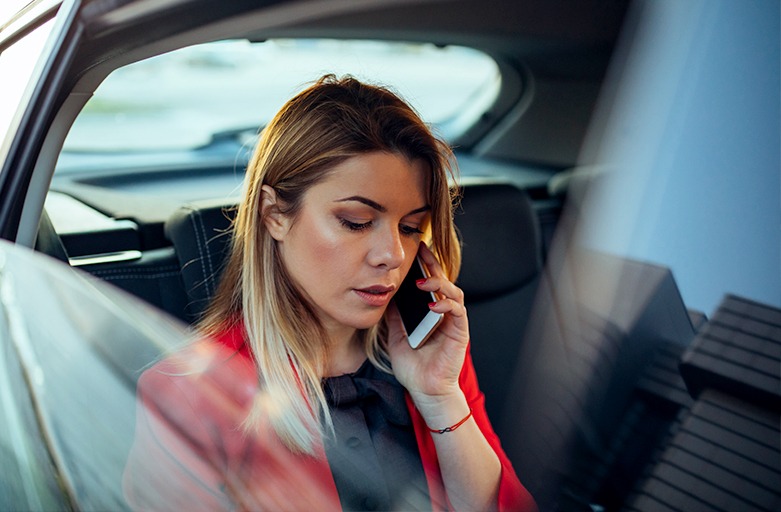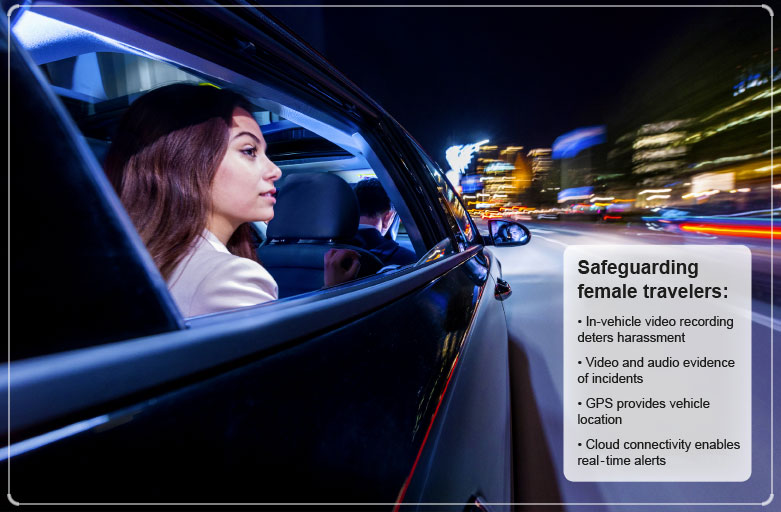More women travel alone than ever before, whether it’s for business trips or holidays across the globe. In our towns and cities, public transport, taxis and rideshares are common modes of travel for women. But how safe are lone women on our transport systems, and how could technology like dash cams and the cloud help to make transportation safer for women?
Research from the Global Business Travel Association finds that while the number of women travelling for business is rising, 71% of female business travellers feel they face greater risk levels than their male counterparts.Furthermore, figures from Hostelworld show that solo holiday travel is also increasingly popular, and that women are leading the way. Bookings from single American women rose by 45% between 2015 and 2017, compared to 40% for single men – despite well-publicized and often shocking reports of attacks on female travelers.
But it’s not just overseas travelers that face harassment and aggression. Women going about their everyday business on trains, buses, in cabs and in rideshares can also experience problems. Just 9% of 9,000 women in India surveyed by the Ola Mobility Institute said they felt completely safe on public transport, for example.
Grabbing a Lyft
Meanwhile, massive growth in the use of rideshare services such as Uber and Lyft, while creating huge convenience for millions, has introduced new risks for vulnerable travelers. In a case that legal firm Irwin Mitchell said was the first of its kind in the UK, two women won undisclosed damages against Uber after a driver was found guilty of sexually assaulting them in two separate incidents.
Passengers are not the only women who are at risk. Female cab and rideshare drivers are also vulnerable to attacks. Many have gone on record to report regular incidents of being grabbed or assaulted, sometimes at least once every day.
Hannah Minter, a driver in Savannah, Georgia, USA told Bloomberg she frequently encounters passengers who make comments or try to touch her inappropriately. “Every single time, every day that I drive, every night that I drive, there is at least one questionable experience,” she said.
The evidence is clear that this is a significant problem that affects everyone. When women are anxious about travelling, whether that’s by public transport or via ridesharing services, they are unlikely to be in the best position to fulfill their full potential.
Even in the simplest example of female Uber drivers who take (unpaid) time off work following verbal or physical assaults, or the teenage girl afraid to travel to school on public transport, incidents can have far-reaching economic impacts on society as well on women themselves.
It’s certainly a problem taken seriously by the United Nations, which states that: “One in three women are likely to face violence in their lifetimes, but public services, urban planning and transport systems are rarely planned with women’s safety and mobility in mind.”
The Video Technology Solution
Given that the situation isn’t going to change overnight, video technology could prove to be the answer. The increasing power of ever-cheaper video capture and streaming technology, together with higher 4G and 5G mobile bandwidth, could transform women’s experience of travel in the near future.

Video is already used successfully in other situations where both evidence-gathering and protection may be needed. CCTV in public spaces – now widely accepted as a means of identifying criminals and antisocial behavior – is just the start. Householders increasingly install low-cost video cameras that allow them to monitor their properties, people knocking on their doors, or even pets left home alone.
Action cameras are used by many cyclists and motorists to capture potential incidents as and when they happen. Police officers are equipped with body worn video (BWV) that can be triggered by certain events or actions, such as pulling a taser or a gun out of its holster.
‘Crowd-sourced evidence gathering’ is also on the rise, with police forces regularly requesting footage from home CCTV and dash cams to be submitted to help with criminal investigations.
Cloud-Connected AI Dash Cams
The very presence of equipment that can capture unfolding events can be enough to dissuade criminal or anti-social behavior. But it is the event-driven and cloud connectivity aspects of video that could have the biggest potential for change in the modern world of public transport.
While consumer devices are great for capturing individual incidents, they are less useful for transport companies and for fleet owners that need longer-term evidence gathered from multiple journeys. A small device will simply record over video footage once it runs out of storage space, but a cloud-connected dash cam with 4G/5G connectivity can be a real game-changer.
A dual-camera AI dash cam that records both video and audio inside of the car can ensure that the driver and passenger behave appropriately and provide evidence of alleged incidents when required. With cloud connectivity and AI-powered alerts, fleet managers can respond immediately if such incidents occur by notifying the police and giving them the exact location, make, model and registration of the car, and even a description or screen capture of the driver from the dash cam.

Of course, there are always privacy concerns about the rising tide of technology designed to capture everyday life. And people may well feel unhappy and fearful about how video footage may be used on social media and beyond. But with the right legal frameworks – and when it can help reduce the number of incidents where women are harassed or attacked while using public transportation, wherever they are in the world – it’s clear that cloud-connected AI dash cams are a key part of the solution.
The VIA Mobile360 D700 AI Dash Cam combines cutting-edge AI-powered accident prevention and driver monitoring features with dual 1080p cameras, ultra-reliable 4G LTE connectivity, and seamless cloud integration to provide a robust and high-performance dual-camera device that is ideal for fleet management applications such as taxis and ride-hailing services. Learn more about the VIA Mobile360 D700 AI Dash Cam here.
